
The Morant Bay Rebellion was a significant part of Jamaican History. This affected a significant change in change in the colonial representation of Jamaica. As recorded in American History, the year 1865 has great importance to Black Americans. This year held a significance in Jamaica as well.
In 1865 Jamaica was experiencing a severe drought, economic conditions were bad, even worse for the slaves.
On October 7, 1865, a black man was put on trial and imprisoned for trespassing on a long-abandoned plantation, creating anger among black Jamaicans. When one member of a group of black protesters from the village of Stony Gut was arrested, the protesters became unruly and broke the accused man from prison. When he returned to his home, Bogle learned that he and 27 of his men had warrants issued for their arrest for rioting, resisting arrest, and assaulting the police.
So on October 11th, Bogle marched with a group of protesters to Morant Bay. When the group arrived at the court house they were met by a small volunteer militia who panicked and opened fire on the group, killing seven black protesters before retreating. The black protesters then rioted, killing 18 people (including white officials and militia) and taking control of the town. In the days that followed some 2,000 black rebels roamed the countryside, killing two white planters and forcing others to flee for their lives.
The then Governor Edward Eyre sent government troops to hunt down the poorly-armed rebels and bring Paul Bogle back to Morant Bay for trial. The troops were met with no organized resistance but killed blacks indiscriminately, many of whom had not been involved in the riot or rebellion: according to one soldier, "we slaughtered all before us… man or woman or child". In the end, 439 black Jamaicans were killed directly by soldiers, and 354 more (including Paul Bogle) were arrested and later executed, some without proper trials. Other punishments included flogging for over 600 men and women (including some pregnant women), and long prison sentences.
When Eyre returned to Britain in August of 1866, his supporters held a banquet in his honour, while opponents at a protest meeting the same evening condemned him as a murderer. Opponents went on to establish the Jamaica Committee, which called for Eyre to be tried for his excesses in suppressing the "insurrection." More radical members of the Committee wanted him tried for the murder of British subjects under the rule of law. The Committee included, John Bright, John Stuart Mill, Thomas Huxley, Thomas Hughes and Herbert Spencer. An opposing committee, which included such Tories and Tory socialists as Thomas Carlyle, Rev. Charles Kingsley, and John Ruskin, sprang up in Eyre's defence. Twice Eyre was charged with murder, but the cases never proceeded.
As a result of the Morant Bay Rebellion, the Rio Cobre irrigation scheme, the Kingston Public Hospital and the Bellevue Hospital were established. It was also the start of the struggle for Universal Adult Suffrage, self-government and finally political independence. The Morant Bay Rebellion took place nearly 23 years before the birth of Marcus Mosiah Garvey, who was born in 1887. It was then his turn to run with the baton until it was passed to Alexander Bustamante and Norman Manley in 1938.
According to what we learn, the "Underhill meetings" chaired by Edward Underhill in 1865 discussed Universal Adult Suffrage and political independence. Universal Adult Suffrage means that all adults have the right to vote. This was a part of the charter of Marcus Garvey's People's Political Party in 1929. But only taxpayers could vote at the time, so Garvey and his PPP candidates lost.
But 70 years later in 1935, the National Reform Association was born. This was the forerunner of the People's National Party led by Norman Manley, which was established in September 1938 to fight for universal adult suffrage, self-government and political independence. In May 1938, Alexander Bustamante formed the Bustamante Industrial Trade Union. The struggle of the peasant farmers which began with the Morant Bay Rebellion in 1865 advanced to a higher level when Bustamante formed this trade union to address their plight.
While some historians have argued that the Morant Bay uprising was no more than a local riot, in its wake the Jamaica Assembly renounced its charter and Jamaica became a Crown Colony.
For more reading about the Morant Bay Rebellion see the following sources:- http://en.wikipedia.org/wiki/Morant_Bay_rebellion
- Morant Bay the effects now
.

No comments:
Post a Comment